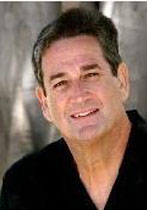By Rabbi Ben Kamin

SAN DIEGO — It’s hard not to choke back tears while watching the Changing of the Guard ceremony at the Tomb of the Unknowns at Arlington National Cemetery. I catch my breath short at even the smallest military or naval funeral I perform—particularly when a twenty-something boy or girl in a crisp uniform, wearing white gloves, a total stranger with brass buttons, leans over with a perfectly folded American flag and says to a mother or a widow: “On behalf of the President of the United States and a grateful nation…”
So I have nothing but the deepest love for this churning and complex nation which accepted my family as immigrants and I regard my citizenship with the same ardor as my personal faith. That is why I find one-dollar jingoistic bumper stickers peeling off cars as depraved and undignified; that is why I consider a grown-up former beauty queen and erstwhile governor who declares herself to be “a Christian and a patriot” in order to beguile us with her American insights to be a kind of jingoistic dunce with lipstick.
This great country is about a historic severance from monarchial and religious tyrannies. It is about the ingathering of immigrants and exiles and the evolution of human rights. It is about education and remembrance—in spite of its ever-quickening pace, its cybernetic conversion from reading to roaming, from books to Facebook, from text to texting, from letters to lasers.
And that is why I grieve a little on Memorial Day. No one is suddenly turning evil on this sale-holiday, and there are a lot of folks who are actually considering our fallen soldiers and sailors and air corps in reflection and acclamation. Some have visited the achingly dignified chalk rows of national cemeteries, from Togus in Maine to Arlington to Fort Rosecrans in San Diego. Many neighbors have raised the colors at home.
But the national memory wanes–even a perfunctory pause of genuine tribute that takes into account the heat, fire, gas, seawater, blood, horror, madness, dysfunction, insanity of WAR—to which we have sent millions of young men and women for over two centuries. So too the unbearable reality that so many have been burnt, shot, hung, whipped, poisoned, stabbed, buried alive, drowned, starved to death, raped, or simply left to die exposed in some jungle or at sea. All of this has been subordinated, I must say, to the charcoal grills, the retail sales, the swimming pool openings, and the first round of baseball interleague play which we seem to associate Memorial Day more than our veterans, martyrs, and MIAs.
Let us not permit the night its cool entry, the last beer cans thrown to the side, the final barbecue embers dying, our bellies aching from indulgence, without at least turning our spirits to the soldiers. They fought in places that most of us cannot envisage. The ones who died were often scared in their final few moments and there was nothing but cold desperation and a surreal smoke around them; no pastor or Mother or even a comprehensible thought to bring some closure. They were really there—in Korea, in New Guinea, at Midway, in Saigon, at the Bulge, the Alamo, at Amiens, the Balkans, in Lebanon, Kuwait, Basra, and Kabul.
It’s just fine to eat burgers and drink margaritas and play some ball on Memorial Day—this is what they died for and this why we live. It would just be even finer if we really remembered the connection.
*
Rabbi Kamin is a freelance writer based in San Diego. He may be contacted at ben.kamin@sdjewishworld.com
I very much appreciate this sentiment Rabbi Kamin. As a Clinical Nurse Specialist in Psychiatry I spent many years working in a VA outpatient clinic with combat veterans suffering from the emotional and psychological ravages of war both declared and undeclared. When we send young people off to war we, as a nation, need to be aware of the price they pay for serving this country. There is no trauma so great as the confrontation with one’s own capacity to do evil – it is a VERY high price.